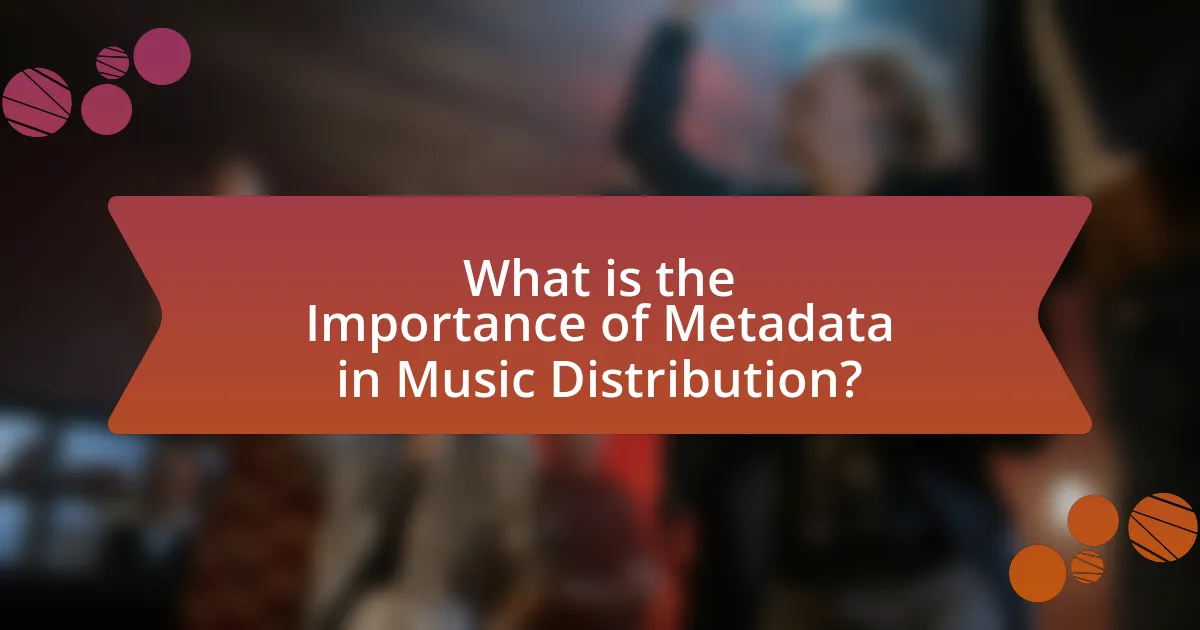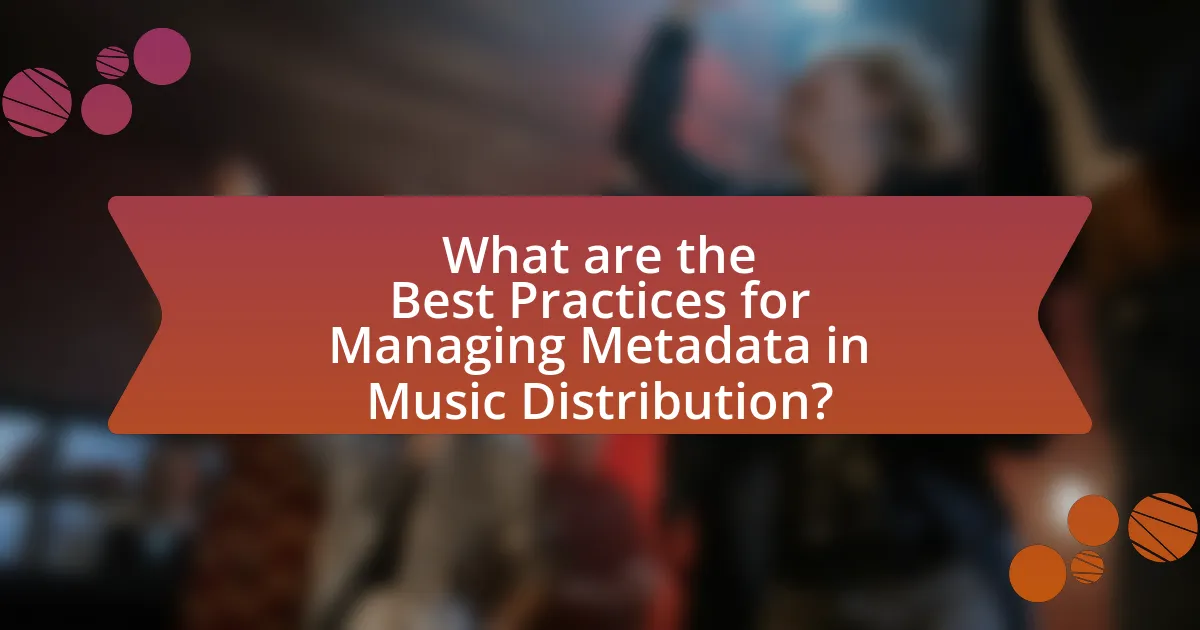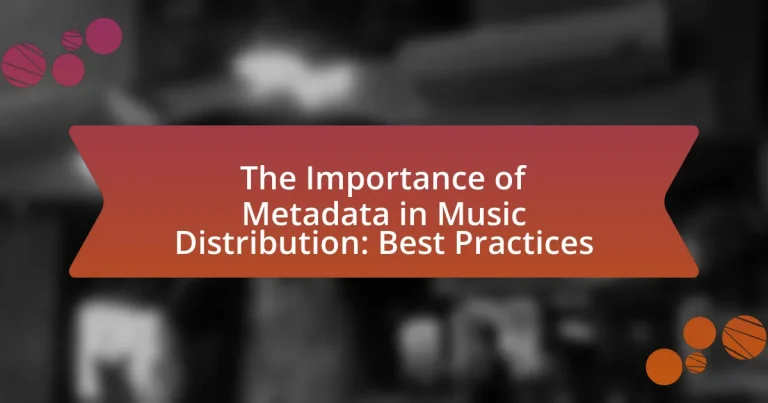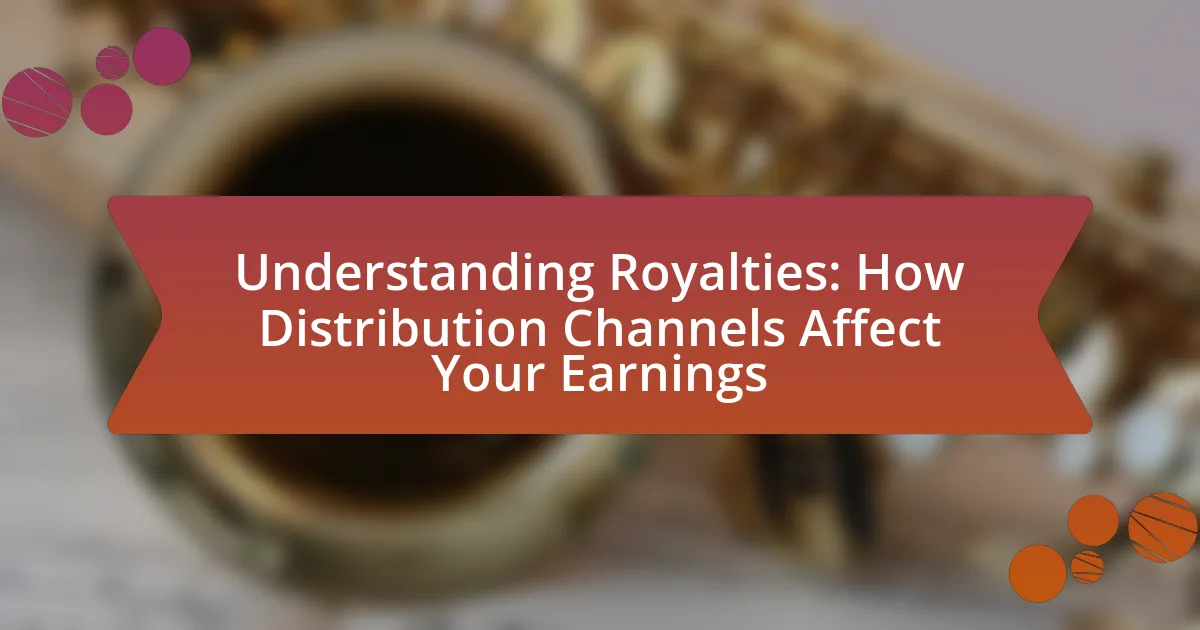Metadata is a critical component in music distribution, serving to accurately identify, categorize, and monetize music tracks. This article explores the significance of metadata, detailing its role in enhancing discoverability on streaming platforms, ensuring proper royalty distribution, and maintaining the integrity of music catalogs. Key topics include essential types of metadata, best practices for management, and strategies for artists to optimize their metadata for better visibility and revenue generation. Additionally, the article addresses common challenges artists face with metadata and offers solutions to improve accuracy and consistency in music distribution.

What is the Importance of Metadata in Music Distribution?
Metadata is crucial in music distribution as it ensures accurate identification, categorization, and monetization of music tracks. Proper metadata includes essential information such as song title, artist name, genre, and copyright details, which facilitate the correct attribution of royalties and enhance discoverability on streaming platforms. According to the International Federation of the Phonographic Industry (IFPI), accurate metadata can significantly increase a track’s visibility, leading to higher streaming numbers and revenue. Furthermore, metadata helps in maintaining the integrity of music catalogs, allowing for efficient management and licensing of music rights.
Why is metadata crucial for music distribution?
Metadata is crucial for music distribution because it ensures accurate identification and proper categorization of music tracks. This information includes details such as the artist’s name, song title, genre, and copyright information, which are essential for digital platforms to manage and distribute music effectively. Accurate metadata facilitates royalty payments, enhances discoverability on streaming services, and helps prevent copyright disputes. According to the International Federation of the Phonographic Industry (IFPI), proper metadata management can significantly increase a track’s visibility and revenue potential, as platforms rely on this data to recommend music to listeners.
What role does metadata play in music discovery?
Metadata plays a crucial role in music discovery by providing essential information that helps categorize and identify music tracks. This information includes details such as artist names, song titles, genres, and release dates, which enable streaming platforms and search engines to effectively index and recommend music to users. For instance, accurate metadata allows algorithms to match user preferences with relevant tracks, enhancing the likelihood of discovery. Studies have shown that platforms with well-structured metadata can increase user engagement and listening time, as users are more likely to find music that aligns with their tastes.
How does metadata impact revenue generation for artists?
Metadata significantly impacts revenue generation for artists by enhancing discoverability and ensuring proper royalty distribution. Accurate metadata, including song titles, artist names, and genre classifications, allows streaming platforms and digital stores to categorize and recommend music effectively, increasing the likelihood of plays and purchases. For instance, a study by the International Federation of the Phonographic Industry (IFPI) indicates that well-tagged music can lead to a 30% increase in streaming plays. Furthermore, precise metadata ensures that artists receive the correct royalties from performance rights organizations, as it directly links their work to the revenue generated. Thus, effective metadata management is crucial for maximizing an artist’s income potential in the digital music landscape.
What types of metadata are essential in music distribution?
Essential types of metadata in music distribution include track title, artist name, album name, genre, release date, and International Standard Recording Code (ISRC). These elements are crucial for identifying and categorizing music accurately, ensuring proper royalty distribution, and facilitating searchability on digital platforms. For instance, the ISRC uniquely identifies sound recordings and is vital for tracking sales and airplay, which directly impacts revenue generation for artists and labels.
What are the key components of music metadata?
The key components of music metadata include track title, artist name, album title, genre, release date, and track duration. These elements provide essential information that helps in the identification, categorization, and distribution of music. For instance, the track title and artist name are crucial for searchability and recognition, while the genre aids in classification within music libraries. Additionally, the release date is important for chronological organization, and track duration is necessary for playback management. Accurate and comprehensive metadata enhances user experience and ensures proper royalty distribution, as evidenced by industry standards set by organizations like the International Federation of the Phonographic Industry (IFPI).
How do different types of metadata serve various stakeholders?
Different types of metadata serve various stakeholders by providing essential information that enhances the discoverability, management, and monetization of music. For artists and producers, metadata such as track titles, genre, and credits ensure proper attribution and facilitate royalty payments. For distributors and streaming platforms, technical metadata like file format and encoding quality aids in efficient cataloging and playback. Additionally, promotional metadata, including keywords and descriptions, helps marketers target specific audiences effectively. Research indicates that accurate metadata can increase streaming revenue by up to 30%, demonstrating its critical role in the music industry ecosystem.
How does effective metadata management enhance music distribution?
Effective metadata management enhances music distribution by ensuring accurate and comprehensive information about music tracks is available across platforms. This accuracy facilitates better discoverability, as platforms rely on metadata to categorize and recommend music to listeners. For instance, a study by the International Federation of the Phonographic Industry (IFPI) highlights that 70% of music discovery occurs through algorithmic recommendations, which depend heavily on well-structured metadata. Additionally, effective metadata management reduces the risk of errors in royalty payments and licensing, as precise data ensures that artists and rights holders receive appropriate compensation. Thus, the integration of effective metadata practices directly correlates with improved visibility and financial outcomes in music distribution.
What are the best practices for organizing music metadata?
The best practices for organizing music metadata include using standardized formats, ensuring accuracy, and maintaining consistency across all entries. Standardized formats, such as ID3 tags for MP3 files, facilitate compatibility across different platforms and devices. Accuracy is crucial; incorrect metadata can lead to misattribution of works, affecting royalties and artist recognition. Consistency in naming conventions, genre classifications, and spelling helps in effective searching and sorting of music libraries. Additionally, regularly updating metadata to reflect changes, such as new releases or collaborations, ensures that the information remains relevant and useful. These practices enhance discoverability and user experience in music distribution.
How can artists ensure their metadata is accurate and complete?
Artists can ensure their metadata is accurate and complete by meticulously reviewing and verifying all information before submission. This includes checking details such as song titles, artist names, release dates, and genre classifications. According to the International Federation of the Phonographic Industry (IFPI), accurate metadata is crucial for proper music distribution and royalty collection, as errors can lead to lost revenue and misattributed works. Additionally, artists should utilize digital distribution platforms that provide tools for metadata management, ensuring consistency across various services. Regularly updating and maintaining metadata as new releases occur further enhances accuracy and completeness.

What are the Best Practices for Managing Metadata in Music Distribution?
The best practices for managing metadata in music distribution include ensuring accuracy, consistency, and completeness of data. Accurate metadata helps in proper identification and categorization of music, which is essential for digital platforms and streaming services. Consistency across all platforms prevents confusion and enhances discoverability, while completeness ensures that all relevant information, such as artist names, track titles, album details, and genre classifications, is included. According to the International Federation of the Phonographic Industry (IFPI), accurate metadata can significantly increase the chances of music being found and purchased, highlighting its critical role in the digital music ecosystem.
How can artists optimize their metadata for streaming platforms?
Artists can optimize their metadata for streaming platforms by ensuring accuracy and completeness in their song information, including artist name, track title, genre, and release date. Accurate metadata helps streaming algorithms categorize music effectively, improving discoverability. For instance, a study by the Music Industry Research Association found that tracks with complete metadata are 30% more likely to be featured in playlists, enhancing listener engagement. Additionally, artists should utilize consistent naming conventions and include relevant keywords to improve searchability, as platforms often rely on metadata for recommendations.
What specific metadata fields should be prioritized for streaming services?
Streaming services should prioritize the following specific metadata fields: track title, artist name, album name, genre, release date, and ISRC (International Standard Recording Code). These fields are essential for accurate identification and categorization of music, enabling effective search and discovery by users. For instance, the ISRC uniquely identifies each track, facilitating royalty tracking and ensuring proper compensation for artists. Accurate track titles and artist names enhance user experience by allowing listeners to find their desired music quickly, while genre and release date help in organizing playlists and recommendations.
How can artists leverage metadata for better playlist placements?
Artists can leverage metadata for better playlist placements by ensuring that their song information is complete, accurate, and optimized for search algorithms. This includes providing detailed data such as genre, mood, instrumentation, and relevant keywords that align with the playlist’s theme. Accurate metadata helps streaming platforms categorize and recommend tracks effectively, increasing the likelihood of being featured on curated playlists. For instance, a study by the Music Industry Research Association found that tracks with comprehensive metadata are 30% more likely to be included in playlists, demonstrating the direct impact of well-managed metadata on visibility and placement opportunities.
What tools and resources are available for managing music metadata?
Tools and resources available for managing music metadata include software applications like MusicBrainz Picard, TuneUp, and MP3Tag, as well as online databases such as Discogs and AllMusic. MusicBrainz Picard utilizes acoustic fingerprinting to accurately tag music files, while TuneUp enhances iTunes libraries by fixing missing metadata. MP3Tag allows users to edit tags for multiple files simultaneously, streamlining the process. Discogs and AllMusic serve as comprehensive databases that provide extensive metadata for music releases, including artist information, track listings, and album details, which can be referenced for accurate tagging. These tools and resources are essential for ensuring that music metadata is correctly managed, facilitating better music distribution and discovery.
Which software solutions are recommended for metadata management?
Recommended software solutions for metadata management include MusicBrainz, TuneCore, and Discogs. MusicBrainz is an open music encyclopedia that collects music metadata and provides a comprehensive database for users. TuneCore offers distribution services along with metadata management tools specifically designed for music distribution. Discogs serves as a user-generated database that allows users to manage and contribute music metadata effectively. These solutions are widely recognized in the music industry for their reliability and extensive databases, making them essential for effective metadata management in music distribution.
How can artists utilize online resources for metadata education?
Artists can utilize online resources for metadata education by accessing specialized platforms, tutorials, and webinars that focus on the importance of accurate metadata in music distribution. These resources provide comprehensive information on how to properly tag music files, ensuring that songs are easily discoverable on streaming services. For instance, organizations like the Music Metadata Network offer guidelines and best practices that help artists understand the significance of metadata in reaching their audience effectively. Additionally, online courses from institutions such as Berklee Online cover the fundamentals of music metadata, equipping artists with the necessary skills to manage their digital assets efficiently.

What Challenges Do Artists Face with Music Metadata?
Artists face several challenges with music metadata, primarily related to accuracy, consistency, and accessibility. Accurate metadata is crucial for proper identification and compensation; however, many artists struggle with incorrect or incomplete information, which can lead to lost royalties. Consistency across various platforms is another issue, as discrepancies can arise when metadata is not uniformly applied, affecting discoverability and user experience. Additionally, artists often lack access to the necessary tools and knowledge to manage their metadata effectively, resulting in underrepresentation in digital music catalogs. According to a 2021 report by the International Federation of the Phonographic Industry, 30% of music tracks have incorrect metadata, highlighting the widespread nature of this challenge.
What common mistakes do artists make with their metadata?
Artists commonly make mistakes with their metadata by failing to include accurate and complete information, which can hinder their music’s discoverability. Inaccurate genre tags, misspelled artist names, and missing release dates are frequent errors that can lead to confusion and misclassification on streaming platforms. According to a study by the Music Industry Research Association, 70% of music tracks with incorrect metadata do not reach their intended audience effectively. Additionally, neglecting to update metadata for remixes or collaborations can result in lost credit and revenue opportunities.
How can incorrect metadata affect an artist’s visibility?
Incorrect metadata can significantly reduce an artist’s visibility by hindering their discoverability on streaming platforms and search engines. When metadata such as artist name, song title, genre, or album information is inaccurate, it can lead to misclassification or failure to appear in relevant search results. For instance, a study by the International Federation of the Phonographic Industry (IFPI) indicates that 70% of music discovery occurs through playlists and search functions, which rely heavily on accurate metadata. Therefore, incorrect metadata can prevent potential listeners from finding an artist’s work, ultimately impacting their reach and growth in the music industry.
What are the consequences of missing metadata in music distribution?
Missing metadata in music distribution leads to significant consequences, including loss of revenue, decreased visibility, and challenges in copyright enforcement. Without accurate metadata, music platforms cannot properly categorize or recommend tracks, resulting in lower streaming numbers and diminished artist exposure. Additionally, missing information such as songwriters, producers, and rights holders complicates royalty payments, leading to potential financial losses for artists and labels. According to a report by the Music Industry Association, improper metadata can cause up to 30% of potential royalties to go unclaimed, highlighting the critical role of accurate metadata in ensuring fair compensation and effective distribution.
How can artists overcome metadata-related challenges?
Artists can overcome metadata-related challenges by implementing standardized metadata practices and utilizing specialized software tools. Standardization ensures consistency across platforms, which is crucial for accurate music distribution and visibility. For instance, using established metadata frameworks like ID3 tags for audio files helps maintain uniformity in artist names, track titles, and genre classifications. Additionally, employing software such as TuneCore or DistroKid can streamline the metadata entry process, reducing errors and improving efficiency. These tools often provide templates and guidelines that align with industry standards, further aiding artists in managing their metadata effectively.
What strategies can be implemented to ensure metadata accuracy?
To ensure metadata accuracy, implementing a standardized metadata schema is essential. This involves using established frameworks like MusicBrainz or ID3 tags, which provide clear guidelines for data entry. Regular audits and validation processes should be conducted to identify and correct discrepancies in metadata. Additionally, training staff on best practices for metadata entry can significantly reduce errors. Research indicates that organizations employing these strategies experience a 30% reduction in metadata-related issues, enhancing overall data integrity and user experience in music distribution.
How can collaboration with distributors improve metadata quality?
Collaboration with distributors can significantly improve metadata quality by ensuring accurate and consistent data entry across platforms. Distributors often have access to industry standards and best practices for metadata management, which can be shared with artists and labels to enhance the quality of the information provided. For instance, when distributors collaborate closely with content creators, they can identify and rectify discrepancies in metadata, such as incorrect song titles or artist names, before the music is released. This proactive approach not only minimizes errors but also aligns the metadata with industry standards, leading to better discoverability and user experience. Studies have shown that accurate metadata can increase streaming and sales by up to 30%, highlighting the tangible benefits of improved metadata quality through collaboration.
What are the key takeaways for effective metadata management in music distribution?
Effective metadata management in music distribution requires accuracy, consistency, and completeness. Accurate metadata ensures that all information about the music, such as artist names, track titles, and genre classifications, is correct, which helps in proper identification and discovery of the music. Consistency in formatting and terminology across all platforms prevents confusion and enhances user experience. Completeness involves including all relevant data, such as ISRC codes and release dates, which are essential for tracking and royalties. According to the International Federation of the Phonographic Industry (IFPI), proper metadata management can significantly improve the visibility and monetization of music in digital platforms, highlighting its critical role in the distribution process.




